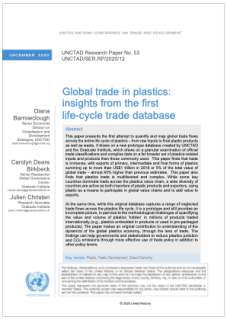
Plastic pollution has fueled the environmental debate since the 1950s. It is only in the last decade, however, that scholarly interest in plastic pollution really starts to grow. Most of the literature has focused on understanding and measuring the leakage of plastic materials into the oceans and its environmental impacts, but not as much on the source of pollution and the potential for policies to curb it by focusing attention on production and consumption.
The paper aims to contribute to a better understanding of the plastics industry and plastics lifecycle through the lens of trade, and to inform analysis of the range of policy levers and tools that could potentially help reduce plastics pollution. Findings are based on a new prototype database created by the United Nations Conference on Trade and Development (UNCTAD) and the Graduate Institute, which draws on a granular examination of official trade classifications and compiles data on a far broader set of plastics-related inputs and products than those commonly used.
Recent efforts to regulate environmentally unsustainable trade in plastic waste have already highlighted the trade policy has a vital role to play as part of the solution to plastic pollution. The report's findings widen the focus beyond waste, suggesting that a logical next step will be to explore the potential role of trade policy to support efforts to reduce plastics pollution across the lifecycle and to transform national and global production systems toward greater environmental sustainability.
